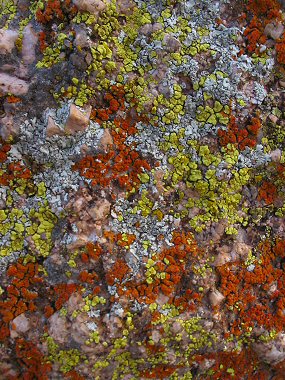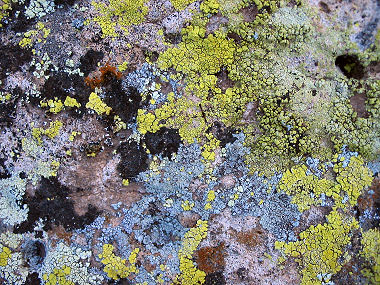Lichen
is a symbiosis (partnership)
 between
a fungus and one or more algae. When the fungus
and algae meet, if they are compatible, they can make a lichen body (thallus).
Each fungus and algae form a unique type of thallus body (three distinct
types can be seen in the photo at right). While the exact relationship
between the two species is still debated, the algae is photosynthetic
which enables it to use sunlight to make sugars or food which will feed
both the fungus and the algae. The fungi normally forms the outer
surface, which offers protection against the weather and results in the
algae having a more stable and constant environment to live in. between
a fungus and one or more algae. When the fungus
and algae meet, if they are compatible, they can make a lichen body (thallus).
Each fungus and algae form a unique type of thallus body (three distinct
types can be seen in the photo at right). While the exact relationship
between the two species is still debated, the algae is photosynthetic
which enables it to use sunlight to make sugars or food which will feed
both the fungus and the algae. The fungi normally forms the outer
surface, which offers protection against the weather and results in the
algae having a more stable and constant environment to live in.
|
A lichen is a symbiosis
(partnership) between a fungus and one or more algae. |
There are many different types of
lichen. Those that grow on the surface of rocks are called crustose
lichens. These lichens form a crust on the substrate on which they are
growing. The crust can be quite thick and granular or actually
embedded within the substrate. Crustose lichens tend to grow out from
their edges and have their fruiting bodies in their centre. Lichens
are delicate and are easily destroyed if walked on.

|

